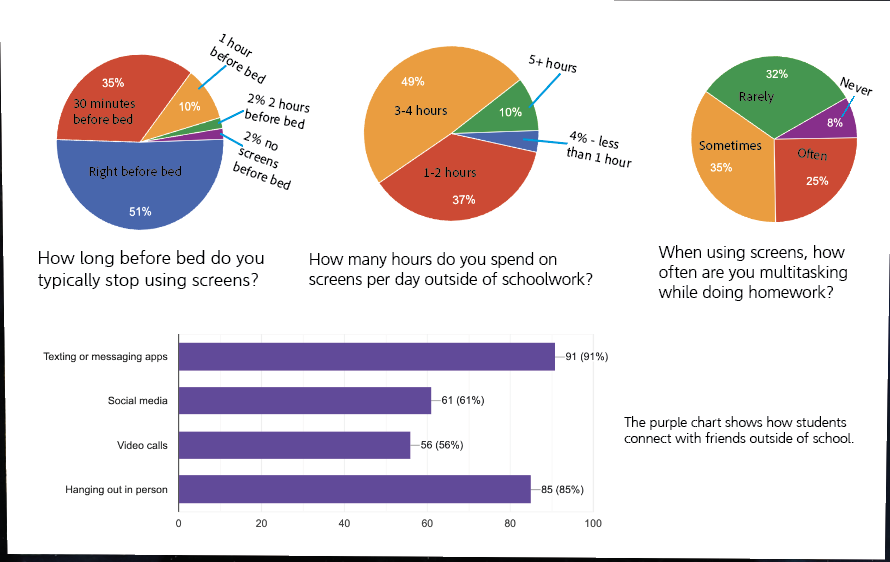Screen Habits Affect Social, Sleep, Grades

Addison VanCleave
Contributing Writer
Screen Use Stirs Sociability
Anxiety, social awareness, and academic performance are all associated with screen time. Although screen time may affect these things, there is more to a teen having a phone than distractions from school. Having a phone can benefit one's social life by being a source of communication for long-distance friendships, as well as being a way to communicate with friends without being together.
After switching to Blake during my freshman year of high school, making friends worried me. Despite my anxiety about making friends, I found that increased screen time positively affected my success in finding friends. My screen time and social media usage affected my transition to a new school by providing me with the resources to connect with people before the first day. I could follow people on Instagram, add people on Snapchat, and create connections with my classmates before meeting them in person. Similarly, social media and using my screen time allow me to maintain my social life much easier than without a phone. Imagine trying to make plans to hang out with people without a phone. You wouldn't know where and when you were meeting unless you planned it the last time you met. My phone has given me the resources to maintain friendships with people who live far away as well. I have many friends who live out of state, and without my phone, those friendships would cease to exist due to having no source of communication.
Despite the negative impact that screen time may have on a teen's sleep, academic performance, and other things, it can ultimately be the source of their social life. Without a phone, I am certain I wouldn't have as many friends as I do today, and my connections with my friends wouldn't be as strong.
Screen Time Caught Stealing Sleep

Steven Cao
Managing Editor
Reels full of Brain Rot, sports events, running memes, and Duke Dennis. Watching YouTube and playing the glorious game called Counter-Strike— a 5 vs 5 first-person competitive shooter game. All things I enjoy doing on screens after a long grind at schoolwork and practice. As the night falls, I think: “Let's just play one game to wind down.” However, the thrills of winning and the anger of losing overwhelm me. To no surprise, I lost self-control and played multiple games in a row. It's midnight, and I finally decide to jump in bed, knowing I have to wake up early for practice and a long school day. Unfortunately, my exposure to blue light energized me, leading to another hour before I fell asleep.
Proper sleep is a key component to performing your best each day. Lackluster rest leads to irritability, poor decision-making, and sluggish reactions. During productive days, I finish my homework and practice by 10 p.m. The next logical step is to brush your teeth and sleep. Many other students and I need entertainment after putting in our efforts into mundane schoolwork. We obtain entertainment through screens, which give off blue light to our eyes. Blue light confuses the brain into thinking it's daytime, leading to a longer process of falling asleep. The lackluster rest impacts performance the next day. At the start of the morning, during my first class, I actually feel quite energized. However, after lunchtime, the fatigue hits hard. During boring lectures, I sometimes feel my eyes droop heavily and have been caught by classmates for napping. As a result, my screen time endeavors led to me losing all the possible knowledge gained from that class. Unfortunately, I have to find extra time to review the content I missed. This results in either sleeping later or waking up earlier for office hours to ensure that I am staying on top of my classes. One day of poor sleep could create a cycle of poor performance. If this cycle builds, I sometimes find myself so tired that I need to nap after coming home from practice. I wake up around dinner time with good energy. However, I lost valuable time when I could’ve done productive work. This energy boost from the evening also makes it difficult to fall asleep at night. Simply put, screen usage could demolish your healthy sleeping schedule.
Willow Overcash
Willow Overcash
Productive Screen Time Strengthens Academic Performance

If you look around this school, all you will see are people on screens. Sometimes, they’re studying for a test. Most of the time, however, people are being what outsiders perceive as counterproductive, playing a game, or scrolling through Instagram or TikTok. Despite what those outsiders believe, I learned in my experience that screen time is not a major factor in your grades.
There are both benefits and downsides to screen time, with the National Institute of Health (NIH) stating, “screens can improve education and learning; however, too much time spent in front of a screen and multitasking with other media has been related to worse executive functioning and academic performance.” The education and learning piece is important, as the NIH argues that screen time can improve language development, access to health resources, and creativity.
Good grades are based on how much effort you put into school, not your screen time. There might be a correlation between these two, but they are separate enough to the point that screen time is not a factor in your grades. Like most of my generation, I probably have too much screen time, but I still get good grades. I have counteracted this supposed imbalance in screen time by using my devices productively and putting in extra effort to make sure I get good grades.
I listen to music often while studying, and my phone counts as screen time. However, this is productive screen time, where I am on a device but still doing work. Other times, I’ll use my computer to do my English homework because my handwriting is impossible to read. Another example of productive screen time is using it to follow current events. I’m not talking about Instagram or TikTok, but reading actual stories from news outlets, such as The Minnesota Star Tribune or The New York Times.
While you should monitor your screen time and ensure balance with your schoolwork, the grades you get will truly depend on the level of effort you put in both inside and outside of class. Screen time may be a factor in those, but to combat this, I encourage productive screen time. Instead of listening to music before you study, listen to your favorite playlist while doing math homework. It’ll help you in the long run.

100 Students Speak

